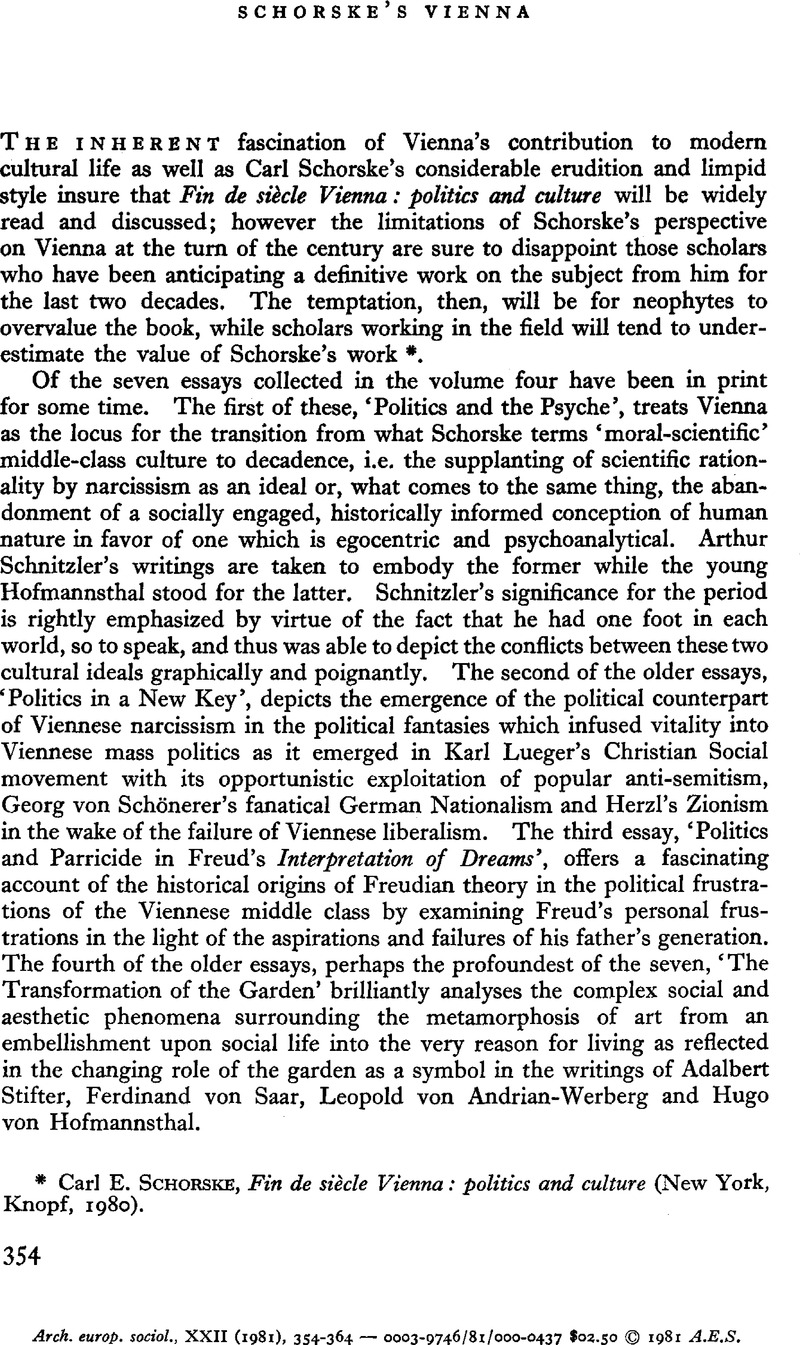No CrossRef data available.

* Schorske, Carl E., Fin de siècle Vienna: politics and culture (New York, Knopf, 1980)Google Scholar.
(1) That this is an original and highly controversial thesis can be measured by the outcry which attended Hugh Trevorroper'S statement of the thesis in his review of Schorske's book in the New York Times Book Review, ‘Letters to the Editor’, Sunday, April 3, 1980, pp. 34–35.
(2) Willett, John, review of Fin de Sièecle Vienna, ap. New York Review of Books, XXVII, no. 5 (04 3, 1980), pp. 19–21Google Scholar.
(3) Sorokim, Pitrim A., The Crisis of Our Age (New York, Dutton, 1941)Google Scholar.
(4) For an account of the relationship between explanations of action in terms of reasons and that in terms of causes see MacIntyre, Alasdair, The Idea of a Social Science, in Wilson, Bryan (ed.), Rationality (New York, Harper and Row, 1970), pp. 112–130Google Scholar.
(5) It would be ridiculous to imagine that Schorske is unaware of the peculiarly Viennese character of Austrian Social Democracy. His student, McGrath, William, has written a brilliant analysis of its origins in Dionysian Art and Populist Politics in Vienna (New Haven, Yale University Press, 1974)Google Scholar. It is unclear why Schorske fails to mention it but it is characteristic of him that he does not relate his work to that of other Austrian intellectual historians.
(6) Torrance, John, The Emergence of Sociology in Austria: 1885–1935, European Journal of Sociology, XVII (1976), pp. 185–219CrossRefGoogle Scholar.
(7) Schick'S, PaulKarl Kraus (Reinbeck bei Hamburg, Rowohlt, 1965)Google Scholar is a useful introduction to Kraus. Schick emphasizes Kraus's role as moral critic of a decadent society. Kraus is recognized among Austrian legal reformers in Kobler's, Felix The Contribution of Austrian Jews to Jurisprudence, in Frankl, Josef (ed.), The Jews of Austria (London, Valentine Mitchell, 1967), p. 40Google Scholar.
(8) Zohn, Harry, Karl Kraus: ‘Jüdischer Selbsthasser’ oder ‘Erzjude’?, Modern Austrian Literature, VIII (1975), pp. 1–19Google Scholar.
(9) I have discussed this more fully in: Wittgenstein: an Austrian enigma, in Nyiri, J.C. (ed.), Austrian Philosophy: Studies and Texts (Munich, Philosophia, forthcoming)Google Scholar.
(10) I have explored some of the implications of recent developments in the discussion of rationality in my critique of Johnston'S, WilliamThe Austrian Mind (Berkeley and Los Angeles, University of California Press, 1972)Google Scholar entitled: Nihilism, Therapeutic: how not to write about Otto Weininger, in Smith, Barry (ed.), Structure and Gestalt (Amsterdam, John Benjamins, forthcoming)Google Scholar.
(11) Janik, Allan and Toulmin, Stephen, Wittgenstein's Vienna (New York, Simon and Schuster, 1973)Google Scholar.
(12) Kann, Robert A., A Study of Austrian Intellectual History: From Baroque to Biedermeier (New York, Praeger, 1960), pp. xix–xxGoogle Scholar.
(13) Boyer, Johnhas made this point concerning the Janik-Toulmin portrait libof Vienna in his review of Wittgenstein's Vienna in the Journal of Modern History, XLVII (1975), p. 710Google Scholar. It is, if anything more appropriate as a criticism of Schorske, for it is unclear how demographic figures benwould have further illuminated Wittgenstein's Tractatus in the way that they would be crucial for understanding the power base of Viennese liberalism.
(14) Nyíiri, J. C. has emphasized the role of the Grazer politician, Moritz von Kaiserfeld, in the development of so-called Alt Liberalismus in a paper delivered to the Austro-German Seminar, 04 26, 1980Google Scholar; ‘Intellectual foundations of Austrian liberalism’. So, it is clear that this is a relevant question.
(15) Dr. Ivar Oxaal of the University Hull is beginning to fill this gap with his studies of Viennese Jewry. I have benefited greatly from discussions of the comtein's plexity, perhaps impossibility, of establishing the sort of thesis Schorske (and Janik and Toulmin following him) advances. DrOxaal, presented a preliminary report on his findings to the Austro-German Seminar in London, 04 26, 1980: From ghetto to weltstadt: Viennese Jews before 1914Google Scholar.
(16) Rath, R. John, The Viennese Revolution of 1848 (Austin, University of Texas Press, 1957), p. 365Google Scholar.
(17) I read this as implicit in Arthur May's account of the development of liberalism in The Habsburg Monarchy, 1867–1914 (New York, Norton, 1951), pp. 46–49Google Scholar.
(18) Mitzman, Arthur, The Iron Cage (New York, Knopf, 1970), pp. 7–8Google Scholar.